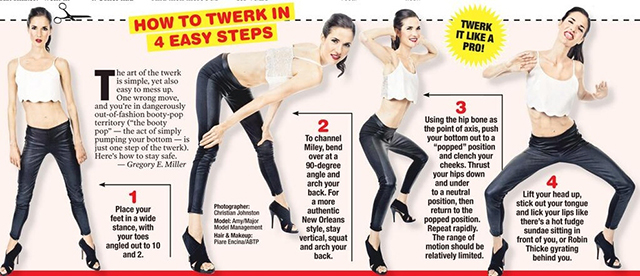
someone pinch me.
They do own the night, and the afternoons too– those pop culture sensations who cause a scene one sordid evening only to dominate the media in the polite light of day. We obviously can’t control how far a cultural phenomenon spreads, but can’t we shake ourselves awake when its impact has clearly gone too far?
For example, just because Breaking Bad throws around the term “teenth” (a unit of measurement in narcotics) and it’s a well-recognized term in the seedy depths of the drug underworld, doesn’t mean it’s a word that needs to be recognized and solidified as a part of our wider culture– does it? Yet here we are. After last week my grandparents (and yes, likely yours too) in Middle America probably now know what “twerking” means thanks to the breathless news coverage of a young woman shaking her assets to dance music on a (pseudo) music channel, which is aimed specifically at people her age (much like her butt was).
But instead of relegating the lewd move to mindless memes and other web jokes, then letting it retire back to the dance halls from whence it came, we’ve added twerk to the Oxford Dictionary and can be seen addressing it on every news site from Forbes to The New York Post (and right here in this very blog). The Post even added a well-meaning (maybe) infographic [below] of a skinny white chick showing us how it’s done.

oh no.
“According to Google,” The Post writes,” searches for the term were flat until April 2011, when they began to rise slowly before exploding this year. This month represents the height of the search term’s popularity.”
But what is the origin of the overblown new buzz word? There is speculation that twerk is a contraction of footwork (‘twork), or could even be a mash-up of “twist” and “jerk,” like it’s most commonly spelled, t-w-e-r-k. Twerking is guessed to have began in the Big Easy in the late 1980s or early 1990s, which is the best guess Millisia White, artistic director of the New Orleans Society of Dance’s Baby Doll Ladies, had for The Post. She says she first heard the term about 20 years ago at underground clubs in New Orleans, “You’d have the deejay call out a [sometimes nonsensical] word or phrase, and people would just interpret it,” White says. “He’d say, ‘Do the pork chop,’ or, ‘Do the Johnny,’ or, ‘Twerk for me.’ ”
So though the word does have a cultural history, albeit a shaky one (no pun intended), where does slang belong in our vernacular? Can’t reasonable people agree to let this retched trend rest? Refinery 29 thinks so. “From here on out,” Refinery 29 declared, “there will be no more mentioning of the twerk. It has had its 15 minutes, been inducted into the Oxford Dictionary, and now we must bid twerking farewell before it becomes the next Harlem Shake, or worse, Soulja Boy’s Superman dance.”
If all we get on board and stop assigning this word more and more leverage, maybe it will slip into obscurity, like the lingering throes of a choking nightmare that finally fade away. — Casandra Armour
















